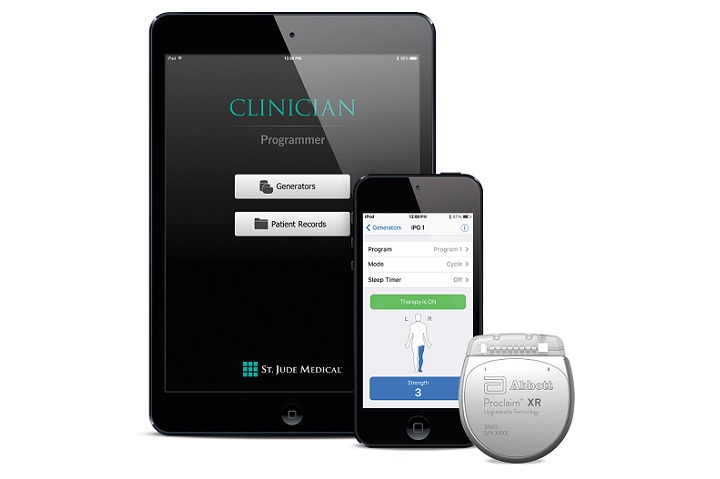Abbott announced today that the U.S. FDA has approved new expanded magnetic resonance imaging (MRI) compatibility for its Proclaim™ XR Spinal Cord Stimulation (SCS) System with Octrode™ leads. The new labeling lifts MRI restrictions for lead tip location and the amount of radiofrequency power that can be used as part of the normal operating mode of an MRI scan. The expanded labeling covers the majority of Proclaim XR patients, providing additional benefits to those patients and their health care providers.
Under the expanded MRI labeling, patients with a Proclaim XR SCS device can benefit from higher quality images with faster MRI scan times.
MRI scanners use powerful magnets and radiofrequency energy to create detailed images of the inside of the body. Concern over how those magnets and radiofrequency energy could impact placement of implantable devices led to conditions being placed on the use of MRIs when a patient had a particular device. Restricted MRI labeling adds a layer of complexity on both patients and radiologists. They must find an imaging facility willing to modify their workflow and work within the MRI labeling limitations of the patient’s implant.
“MRIs have increasingly become an important tool helping doctors diagnose an illness or injury. They are particularly important for patients who have certain comorbidities, such as cancer or multiple sclerosis,” said Allen W. Burton, M.D., medical director of Abbott’s neuromodulation business. “We made it our mission to secure expanded MRI labeling for our spinal cord stimulation devices – both those that were already implanted and those still to be implanted – for the sake of the patients and their doctors.”
With the new labeling, Octrode lead tips can be placed anywhere they are needed along the spine and still be considered MR Conditional, which means a patient can undergo MRI scans within the approved outlined conditions. Radiofrequency energy no longer needs to be limited with Proclaim SCS and Octrode devices as long as the MRI is in the normal operating mode.
“The expanded labeling and reduced scan time address two major issues we face with these implantable devices. By improving the quality of imaging, as well as the experience for both the patient and radiologist, I can now enable more of my existing and new patients to benefit from MRI scans improving their care,” said Steven Falowski, M.D., neurosurgeon at Neurosurgical Associates of Lancaster in Pennsylvania.
Under the expanded labeling, patients with a Proclaim XR SCS device only need to wait 30 minutes between scan cycles of 30 minutes, allowing them to safely receive an MRI scan in a fraction of the time. If a scan exceeds a certain amount of time without a break, radiofrequency energy used during the scans has the potential to heat up the implanted device, which can damage the surrounding tissue. In general, the FDA requires radiologists to pause MRIs for anywhere from 30 to 60 minutes between scan cycles for patients with implants.
The label update will also benefit existing patients implanted with Proclaim XR SCS Systems with Octrode leads improving their access to MRI imaging. “Now more clinicians can utilize MRIs to improve quality of care among a patient population with complex needs. It allows clinicians to get to the source of a particular issue in less time and without fear of compromising safety or creating complications, ” said Timothy Deer, M.D., president and chief executive officer at The Spine and Nerve Centers of the Virginias, serving West Virginia.
The Proclaim XR SCS System is an implantable spinal cord stimulation device designed to allow patients to attain relief from chronic pain of the trunk and limbs. More than 50 million Americans suffer from chronic pain.i There is a high level of clinical evidence for the efficacy of SCS on pain intensity after one year of therapy in patients suffering from a variety of chronic pain conditions.


















